Impact of Hard Brexit on UK, EU, and Automotive Industry: Analysis
VerifiedAdded on 2022/10/11
|14
|3994
|14
Report
AI Summary
This report analyzes the impact of Hard Brexit on the UK, the EU, and the automotive industry, with a specific focus on Volkswagen. It begins by defining Hard Brexit and contrasting it with Soft Brexit, highlighting the automotive industry's vulnerability due to supply chain disruptions and increased costs. The report explores the theory of economic integration, detailing its stages from free trade agreements to political unions, and explains how Hard Brexit disrupts these integrations. It examines the practical consequences of Hard Brexit, including the fall of the pound, the impact on third countries, and the effects on the UK automotive industry, including increased costs and potential sales declines. The report also examines the impact on third countries, such as Bangladesh, and the potential trade disruptions. Finally, it details how Volkswagen, a multinational automotive company, could be impacted by Brexit and suggests possible strategies the company could adopt to mitigate the negative impacts of Brexit on its operations.
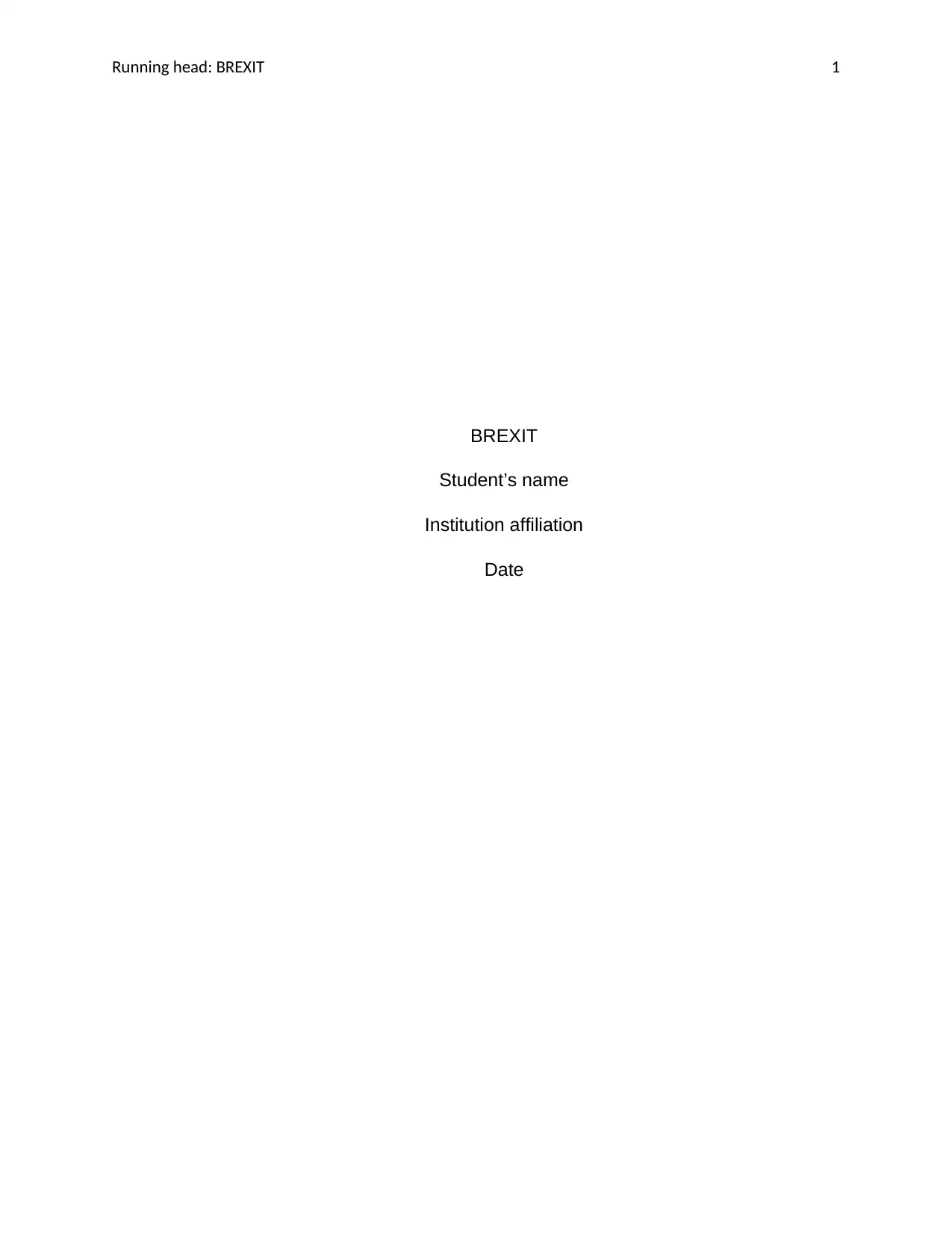
Running head: BREXIT 1
BREXIT
Student’s name
Institution affiliation
Date
BREXIT
Student’s name
Institution affiliation
Date
Paraphrase This Document
Need a fresh take? Get an instant paraphrase of this document with our AI Paraphraser
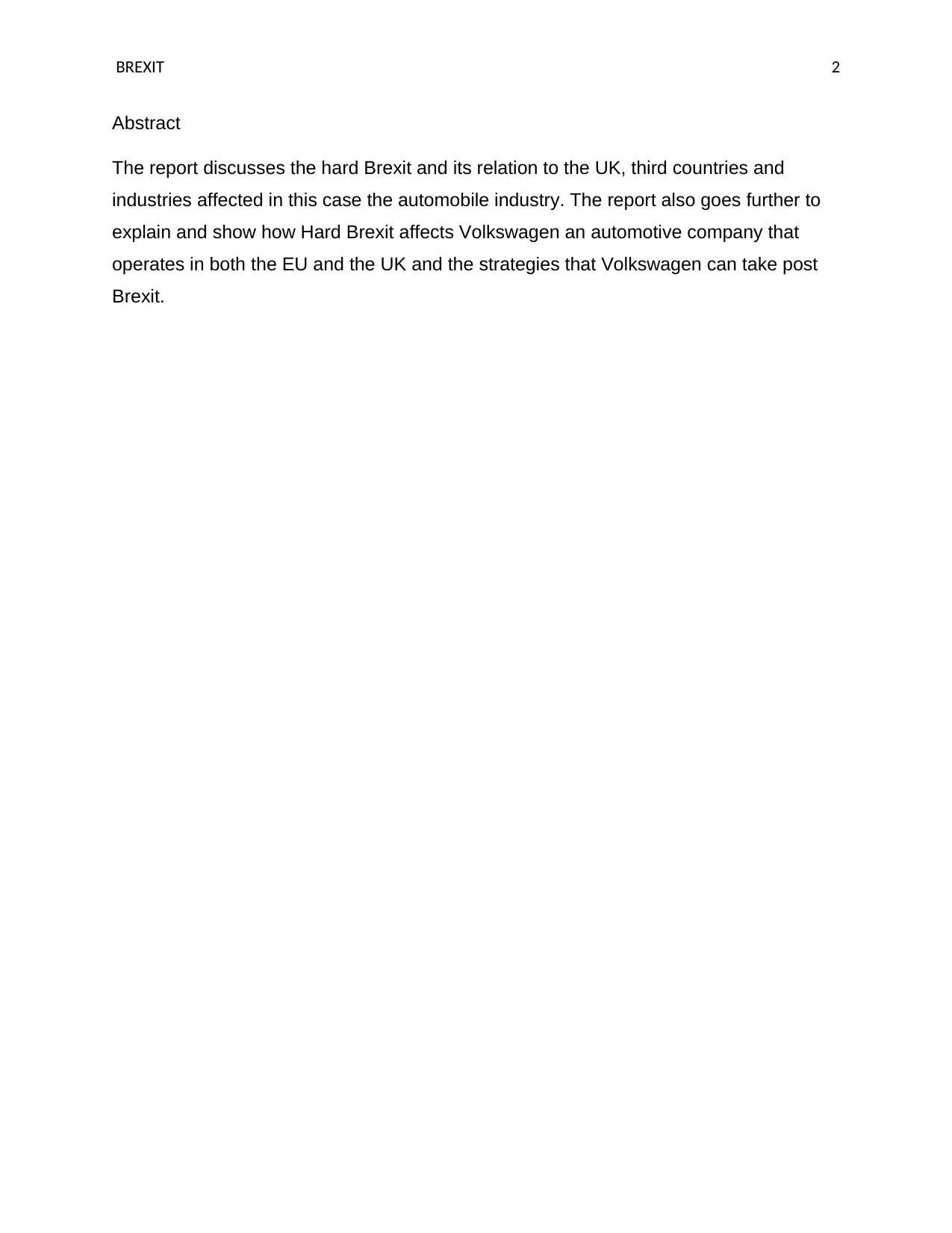
BREXIT 2
Abstract
The report discusses the hard Brexit and its relation to the UK, third countries and
industries affected in this case the automobile industry. The report also goes further to
explain and show how Hard Brexit affects Volkswagen an automotive company that
operates in both the EU and the UK and the strategies that Volkswagen can take post
Brexit.
Abstract
The report discusses the hard Brexit and its relation to the UK, third countries and
industries affected in this case the automobile industry. The report also goes further to
explain and show how Hard Brexit affects Volkswagen an automotive company that
operates in both the EU and the UK and the strategies that Volkswagen can take post
Brexit.
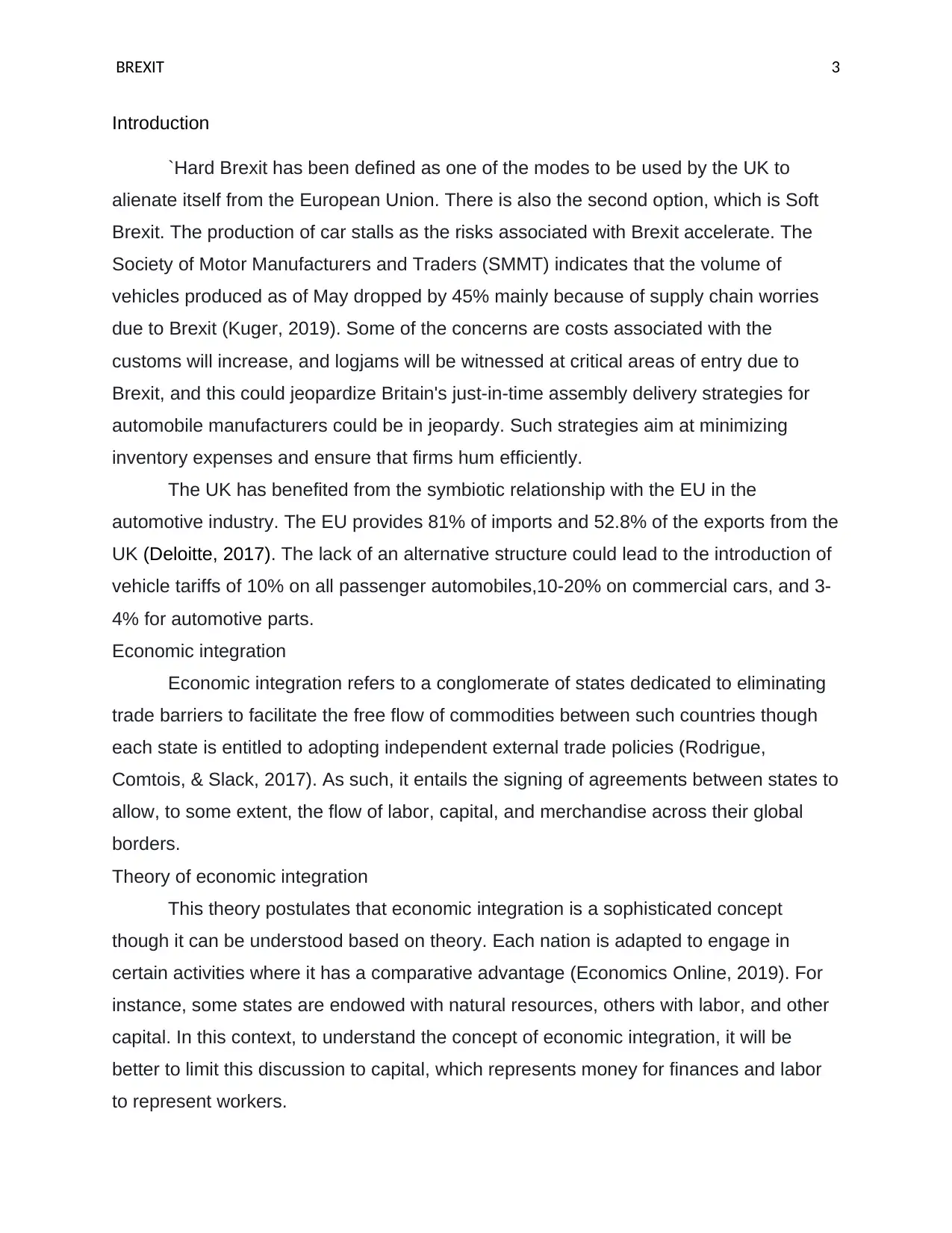
BREXIT 3
Introduction
`Hard Brexit has been defined as one of the modes to be used by the UK to
alienate itself from the European Union. There is also the second option, which is Soft
Brexit. The production of car stalls as the risks associated with Brexit accelerate. The
Society of Motor Manufacturers and Traders (SMMT) indicates that the volume of
vehicles produced as of May dropped by 45% mainly because of supply chain worries
due to Brexit (Kuger, 2019). Some of the concerns are costs associated with the
customs will increase, and logjams will be witnessed at critical areas of entry due to
Brexit, and this could jeopardize Britain's just-in-time assembly delivery strategies for
automobile manufacturers could be in jeopardy. Such strategies aim at minimizing
inventory expenses and ensure that firms hum efficiently.
The UK has benefited from the symbiotic relationship with the EU in the
automotive industry. The EU provides 81% of imports and 52.8% of the exports from the
UK (Deloitte, 2017). The lack of an alternative structure could lead to the introduction of
vehicle tariffs of 10% on all passenger automobiles,10-20% on commercial cars, and 3-
4% for automotive parts.
Economic integration
Economic integration refers to a conglomerate of states dedicated to eliminating
trade barriers to facilitate the free flow of commodities between such countries though
each state is entitled to adopting independent external trade policies (Rodrigue,
Comtois, & Slack, 2017). As such, it entails the signing of agreements between states to
allow, to some extent, the flow of labor, capital, and merchandise across their global
borders.
Theory of economic integration
This theory postulates that economic integration is a sophisticated concept
though it can be understood based on theory. Each nation is adapted to engage in
certain activities where it has a comparative advantage (Economics Online, 2019). For
instance, some states are endowed with natural resources, others with labor, and other
capital. In this context, to understand the concept of economic integration, it will be
better to limit this discussion to capital, which represents money for finances and labor
to represent workers.
Introduction
`Hard Brexit has been defined as one of the modes to be used by the UK to
alienate itself from the European Union. There is also the second option, which is Soft
Brexit. The production of car stalls as the risks associated with Brexit accelerate. The
Society of Motor Manufacturers and Traders (SMMT) indicates that the volume of
vehicles produced as of May dropped by 45% mainly because of supply chain worries
due to Brexit (Kuger, 2019). Some of the concerns are costs associated with the
customs will increase, and logjams will be witnessed at critical areas of entry due to
Brexit, and this could jeopardize Britain's just-in-time assembly delivery strategies for
automobile manufacturers could be in jeopardy. Such strategies aim at minimizing
inventory expenses and ensure that firms hum efficiently.
The UK has benefited from the symbiotic relationship with the EU in the
automotive industry. The EU provides 81% of imports and 52.8% of the exports from the
UK (Deloitte, 2017). The lack of an alternative structure could lead to the introduction of
vehicle tariffs of 10% on all passenger automobiles,10-20% on commercial cars, and 3-
4% for automotive parts.
Economic integration
Economic integration refers to a conglomerate of states dedicated to eliminating
trade barriers to facilitate the free flow of commodities between such countries though
each state is entitled to adopting independent external trade policies (Rodrigue,
Comtois, & Slack, 2017). As such, it entails the signing of agreements between states to
allow, to some extent, the flow of labor, capital, and merchandise across their global
borders.
Theory of economic integration
This theory postulates that economic integration is a sophisticated concept
though it can be understood based on theory. Each nation is adapted to engage in
certain activities where it has a comparative advantage (Economics Online, 2019). For
instance, some states are endowed with natural resources, others with labor, and other
capital. In this context, to understand the concept of economic integration, it will be
better to limit this discussion to capital, which represents money for finances and labor
to represent workers.
⊘ This is a preview!⊘
Do you want full access?
Subscribe today to unlock all pages.

Trusted by 1+ million students worldwide
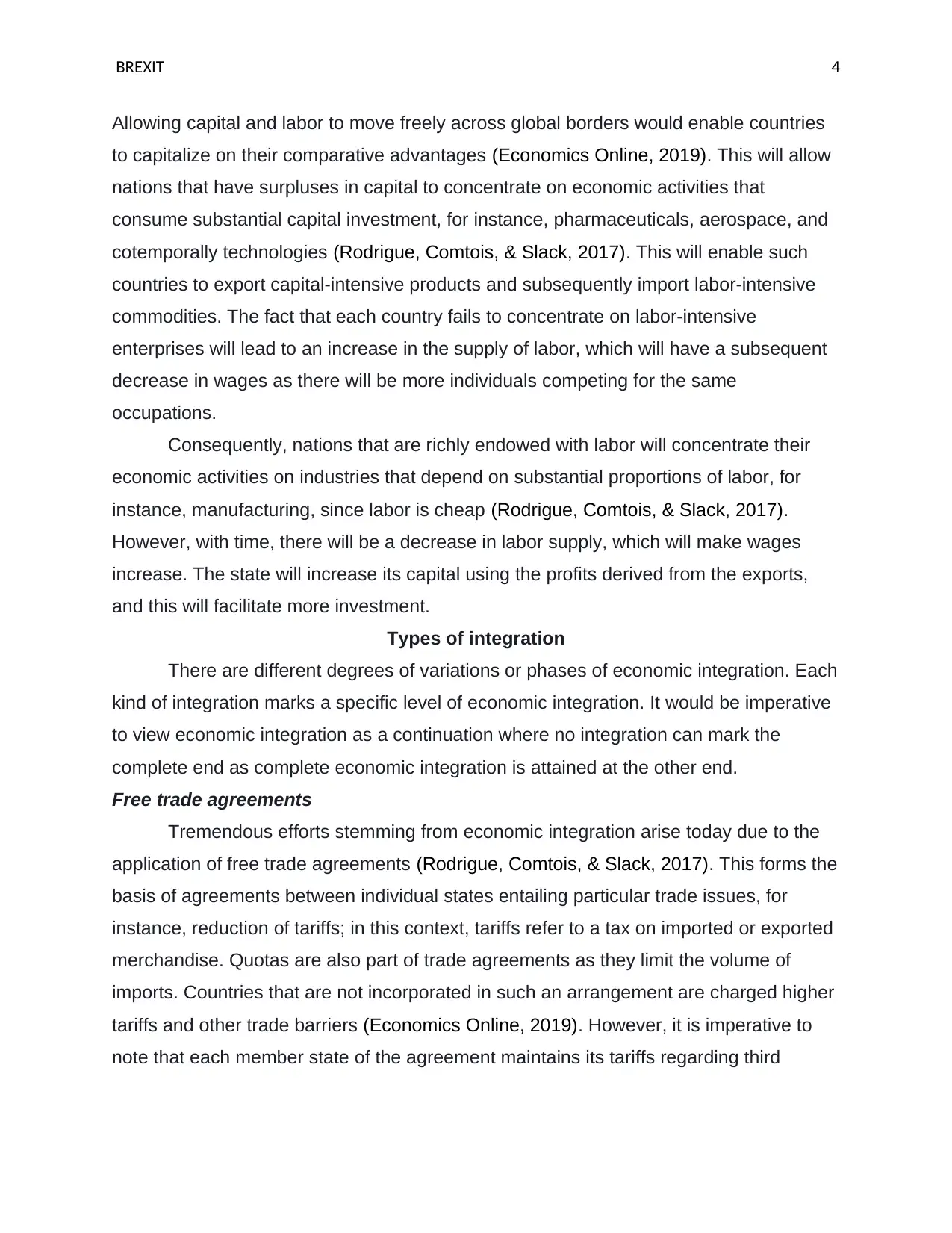
BREXIT 4
Allowing capital and labor to move freely across global borders would enable countries
to capitalize on their comparative advantages (Economics Online, 2019). This will allow
nations that have surpluses in capital to concentrate on economic activities that
consume substantial capital investment, for instance, pharmaceuticals, aerospace, and
cotemporally technologies (Rodrigue, Comtois, & Slack, 2017). This will enable such
countries to export capital-intensive products and subsequently import labor-intensive
commodities. The fact that each country fails to concentrate on labor-intensive
enterprises will lead to an increase in the supply of labor, which will have a subsequent
decrease in wages as there will be more individuals competing for the same
occupations.
Consequently, nations that are richly endowed with labor will concentrate their
economic activities on industries that depend on substantial proportions of labor, for
instance, manufacturing, since labor is cheap (Rodrigue, Comtois, & Slack, 2017).
However, with time, there will be a decrease in labor supply, which will make wages
increase. The state will increase its capital using the profits derived from the exports,
and this will facilitate more investment.
Types of integration
There are different degrees of variations or phases of economic integration. Each
kind of integration marks a specific level of economic integration. It would be imperative
to view economic integration as a continuation where no integration can mark the
complete end as complete economic integration is attained at the other end.
Free trade agreements
Tremendous efforts stemming from economic integration arise today due to the
application of free trade agreements (Rodrigue, Comtois, & Slack, 2017). This forms the
basis of agreements between individual states entailing particular trade issues, for
instance, reduction of tariffs; in this context, tariffs refer to a tax on imported or exported
merchandise. Quotas are also part of trade agreements as they limit the volume of
imports. Countries that are not incorporated in such an arrangement are charged higher
tariffs and other trade barriers (Economics Online, 2019). However, it is imperative to
note that each member state of the agreement maintains its tariffs regarding third
Allowing capital and labor to move freely across global borders would enable countries
to capitalize on their comparative advantages (Economics Online, 2019). This will allow
nations that have surpluses in capital to concentrate on economic activities that
consume substantial capital investment, for instance, pharmaceuticals, aerospace, and
cotemporally technologies (Rodrigue, Comtois, & Slack, 2017). This will enable such
countries to export capital-intensive products and subsequently import labor-intensive
commodities. The fact that each country fails to concentrate on labor-intensive
enterprises will lead to an increase in the supply of labor, which will have a subsequent
decrease in wages as there will be more individuals competing for the same
occupations.
Consequently, nations that are richly endowed with labor will concentrate their
economic activities on industries that depend on substantial proportions of labor, for
instance, manufacturing, since labor is cheap (Rodrigue, Comtois, & Slack, 2017).
However, with time, there will be a decrease in labor supply, which will make wages
increase. The state will increase its capital using the profits derived from the exports,
and this will facilitate more investment.
Types of integration
There are different degrees of variations or phases of economic integration. Each
kind of integration marks a specific level of economic integration. It would be imperative
to view economic integration as a continuation where no integration can mark the
complete end as complete economic integration is attained at the other end.
Free trade agreements
Tremendous efforts stemming from economic integration arise today due to the
application of free trade agreements (Rodrigue, Comtois, & Slack, 2017). This forms the
basis of agreements between individual states entailing particular trade issues, for
instance, reduction of tariffs; in this context, tariffs refer to a tax on imported or exported
merchandise. Quotas are also part of trade agreements as they limit the volume of
imports. Countries that are not incorporated in such an arrangement are charged higher
tariffs and other trade barriers (Economics Online, 2019). However, it is imperative to
note that each member state of the agreement maintains its tariffs regarding third
Paraphrase This Document
Need a fresh take? Get an instant paraphrase of this document with our AI Paraphraser
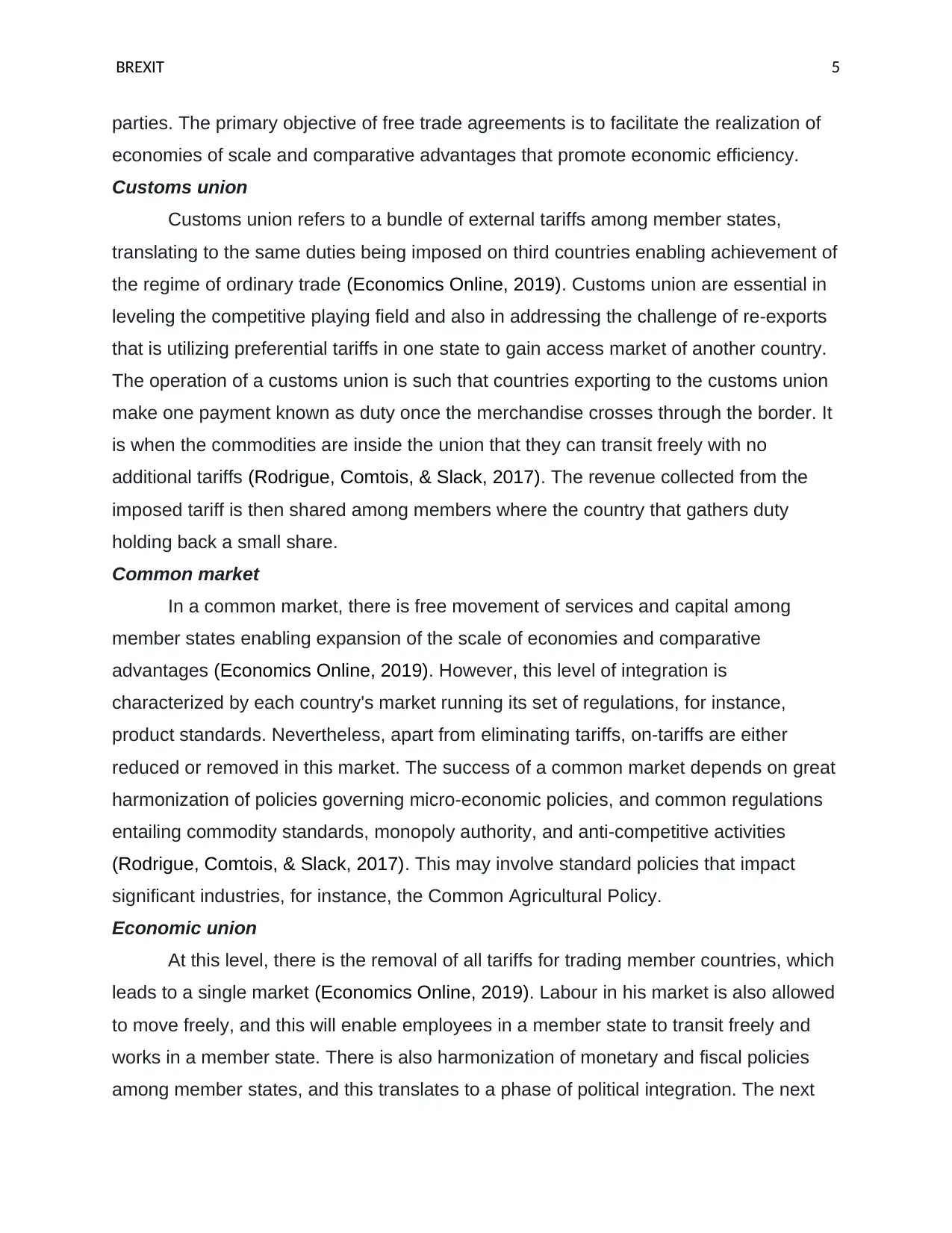
BREXIT 5
parties. The primary objective of free trade agreements is to facilitate the realization of
economies of scale and comparative advantages that promote economic efficiency.
Customs union
Customs union refers to a bundle of external tariffs among member states,
translating to the same duties being imposed on third countries enabling achievement of
the regime of ordinary trade (Economics Online, 2019). Customs union are essential in
leveling the competitive playing field and also in addressing the challenge of re-exports
that is utilizing preferential tariffs in one state to gain access market of another country.
The operation of a customs union is such that countries exporting to the customs union
make one payment known as duty once the merchandise crosses through the border. It
is when the commodities are inside the union that they can transit freely with no
additional tariffs (Rodrigue, Comtois, & Slack, 2017). The revenue collected from the
imposed tariff is then shared among members where the country that gathers duty
holding back a small share.
Common market
In a common market, there is free movement of services and capital among
member states enabling expansion of the scale of economies and comparative
advantages (Economics Online, 2019). However, this level of integration is
characterized by each country's market running its set of regulations, for instance,
product standards. Nevertheless, apart from eliminating tariffs, on-tariffs are either
reduced or removed in this market. The success of a common market depends on great
harmonization of policies governing micro-economic policies, and common regulations
entailing commodity standards, monopoly authority, and anti-competitive activities
(Rodrigue, Comtois, & Slack, 2017). This may involve standard policies that impact
significant industries, for instance, the Common Agricultural Policy.
Economic union
At this level, there is the removal of all tariffs for trading member countries, which
leads to a single market (Economics Online, 2019). Labour in his market is also allowed
to move freely, and this will enable employees in a member state to transit freely and
works in a member state. There is also harmonization of monetary and fiscal policies
among member states, and this translates to a phase of political integration. The next
parties. The primary objective of free trade agreements is to facilitate the realization of
economies of scale and comparative advantages that promote economic efficiency.
Customs union
Customs union refers to a bundle of external tariffs among member states,
translating to the same duties being imposed on third countries enabling achievement of
the regime of ordinary trade (Economics Online, 2019). Customs union are essential in
leveling the competitive playing field and also in addressing the challenge of re-exports
that is utilizing preferential tariffs in one state to gain access market of another country.
The operation of a customs union is such that countries exporting to the customs union
make one payment known as duty once the merchandise crosses through the border. It
is when the commodities are inside the union that they can transit freely with no
additional tariffs (Rodrigue, Comtois, & Slack, 2017). The revenue collected from the
imposed tariff is then shared among members where the country that gathers duty
holding back a small share.
Common market
In a common market, there is free movement of services and capital among
member states enabling expansion of the scale of economies and comparative
advantages (Economics Online, 2019). However, this level of integration is
characterized by each country's market running its set of regulations, for instance,
product standards. Nevertheless, apart from eliminating tariffs, on-tariffs are either
reduced or removed in this market. The success of a common market depends on great
harmonization of policies governing micro-economic policies, and common regulations
entailing commodity standards, monopoly authority, and anti-competitive activities
(Rodrigue, Comtois, & Slack, 2017). This may involve standard policies that impact
significant industries, for instance, the Common Agricultural Policy.
Economic union
At this level, there is the removal of all tariffs for trading member countries, which
leads to a single market (Economics Online, 2019). Labour in his market is also allowed
to move freely, and this will enable employees in a member state to transit freely and
works in a member state. There is also harmonization of monetary and fiscal policies
among member states, and this translates to a phase of political integration. The next
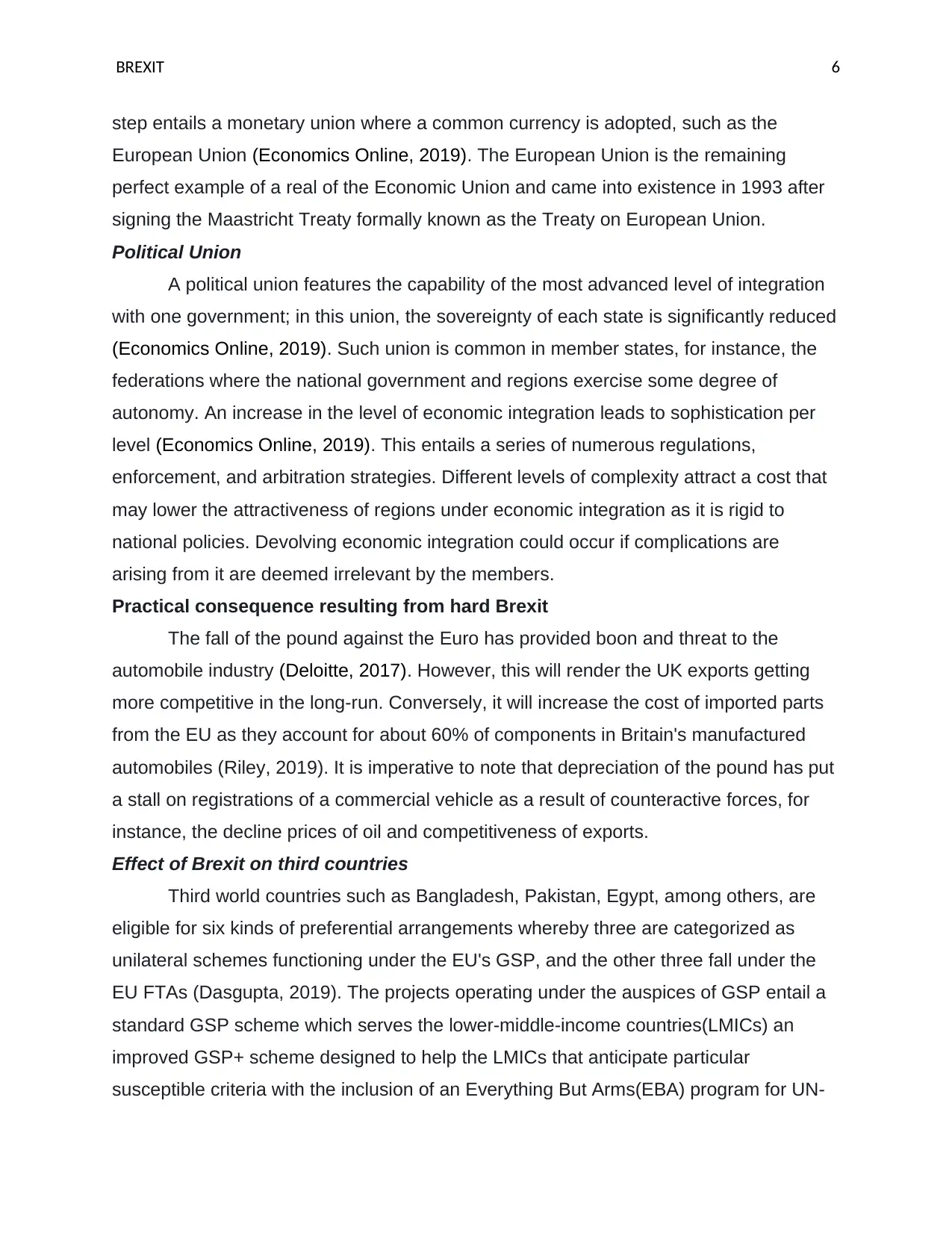
BREXIT 6
step entails a monetary union where a common currency is adopted, such as the
European Union (Economics Online, 2019). The European Union is the remaining
perfect example of a real of the Economic Union and came into existence in 1993 after
signing the Maastricht Treaty formally known as the Treaty on European Union.
Political Union
A political union features the capability of the most advanced level of integration
with one government; in this union, the sovereignty of each state is significantly reduced
(Economics Online, 2019). Such union is common in member states, for instance, the
federations where the national government and regions exercise some degree of
autonomy. An increase in the level of economic integration leads to sophistication per
level (Economics Online, 2019). This entails a series of numerous regulations,
enforcement, and arbitration strategies. Different levels of complexity attract a cost that
may lower the attractiveness of regions under economic integration as it is rigid to
national policies. Devolving economic integration could occur if complications are
arising from it are deemed irrelevant by the members.
Practical consequence resulting from hard Brexit
The fall of the pound against the Euro has provided boon and threat to the
automobile industry (Deloitte, 2017). However, this will render the UK exports getting
more competitive in the long-run. Conversely, it will increase the cost of imported parts
from the EU as they account for about 60% of components in Britain's manufactured
automobiles (Riley, 2019). It is imperative to note that depreciation of the pound has put
a stall on registrations of a commercial vehicle as a result of counteractive forces, for
instance, the decline prices of oil and competitiveness of exports.
Effect of Brexit on third countries
Third world countries such as Bangladesh, Pakistan, Egypt, among others, are
eligible for six kinds of preferential arrangements whereby three are categorized as
unilateral schemes functioning under the EU's GSP, and the other three fall under the
EU FTAs (Dasgupta, 2019). The projects operating under the auspices of GSP entail a
standard GSP scheme which serves the lower-middle-income countries(LMICs) an
improved GSP+ scheme designed to help the LMICs that anticipate particular
susceptible criteria with the inclusion of an Everything But Arms(EBA) program for UN-
step entails a monetary union where a common currency is adopted, such as the
European Union (Economics Online, 2019). The European Union is the remaining
perfect example of a real of the Economic Union and came into existence in 1993 after
signing the Maastricht Treaty formally known as the Treaty on European Union.
Political Union
A political union features the capability of the most advanced level of integration
with one government; in this union, the sovereignty of each state is significantly reduced
(Economics Online, 2019). Such union is common in member states, for instance, the
federations where the national government and regions exercise some degree of
autonomy. An increase in the level of economic integration leads to sophistication per
level (Economics Online, 2019). This entails a series of numerous regulations,
enforcement, and arbitration strategies. Different levels of complexity attract a cost that
may lower the attractiveness of regions under economic integration as it is rigid to
national policies. Devolving economic integration could occur if complications are
arising from it are deemed irrelevant by the members.
Practical consequence resulting from hard Brexit
The fall of the pound against the Euro has provided boon and threat to the
automobile industry (Deloitte, 2017). However, this will render the UK exports getting
more competitive in the long-run. Conversely, it will increase the cost of imported parts
from the EU as they account for about 60% of components in Britain's manufactured
automobiles (Riley, 2019). It is imperative to note that depreciation of the pound has put
a stall on registrations of a commercial vehicle as a result of counteractive forces, for
instance, the decline prices of oil and competitiveness of exports.
Effect of Brexit on third countries
Third world countries such as Bangladesh, Pakistan, Egypt, among others, are
eligible for six kinds of preferential arrangements whereby three are categorized as
unilateral schemes functioning under the EU's GSP, and the other three fall under the
EU FTAs (Dasgupta, 2019). The projects operating under the auspices of GSP entail a
standard GSP scheme which serves the lower-middle-income countries(LMICs) an
improved GSP+ scheme designed to help the LMICs that anticipate particular
susceptible criteria with the inclusion of an Everything But Arms(EBA) program for UN-
⊘ This is a preview!⊘
Do you want full access?
Subscribe today to unlock all pages.

Trusted by 1+ million students worldwide
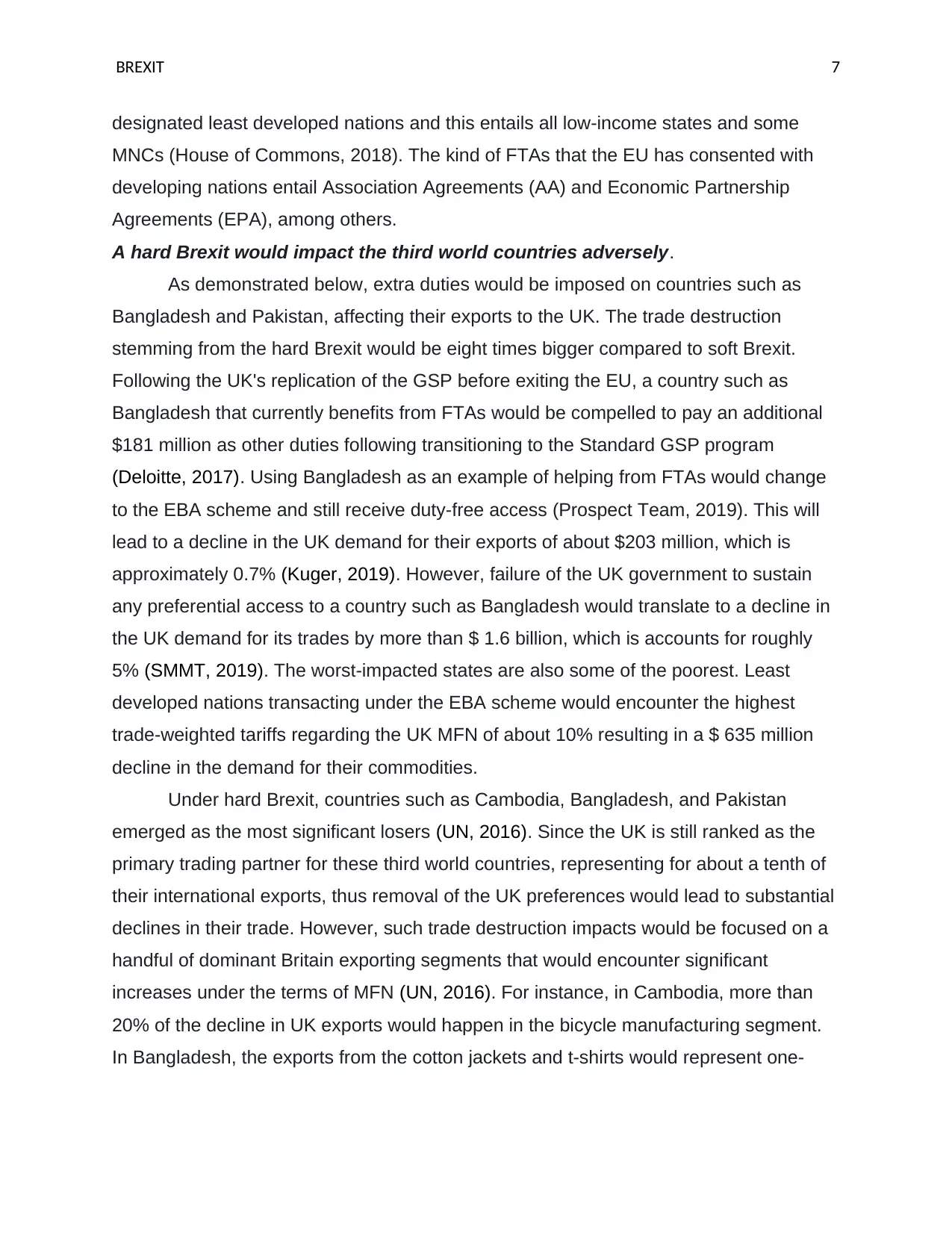
BREXIT 7
designated least developed nations and this entails all low-income states and some
MNCs (House of Commons, 2018). The kind of FTAs that the EU has consented with
developing nations entail Association Agreements (AA) and Economic Partnership
Agreements (EPA), among others.
A hard Brexit would impact the third world countries adversely.
As demonstrated below, extra duties would be imposed on countries such as
Bangladesh and Pakistan, affecting their exports to the UK. The trade destruction
stemming from the hard Brexit would be eight times bigger compared to soft Brexit.
Following the UK's replication of the GSP before exiting the EU, a country such as
Bangladesh that currently benefits from FTAs would be compelled to pay an additional
$181 million as other duties following transitioning to the Standard GSP program
(Deloitte, 2017). Using Bangladesh as an example of helping from FTAs would change
to the EBA scheme and still receive duty-free access (Prospect Team, 2019). This will
lead to a decline in the UK demand for their exports of about $203 million, which is
approximately 0.7% (Kuger, 2019). However, failure of the UK government to sustain
any preferential access to a country such as Bangladesh would translate to a decline in
the UK demand for its trades by more than $ 1.6 billion, which is accounts for roughly
5% (SMMT, 2019). The worst-impacted states are also some of the poorest. Least
developed nations transacting under the EBA scheme would encounter the highest
trade-weighted tariffs regarding the UK MFN of about 10% resulting in a $ 635 million
decline in the demand for their commodities.
Under hard Brexit, countries such as Cambodia, Bangladesh, and Pakistan
emerged as the most significant losers (UN, 2016). Since the UK is still ranked as the
primary trading partner for these third world countries, representing for about a tenth of
their international exports, thus removal of the UK preferences would lead to substantial
declines in their trade. However, such trade destruction impacts would be focused on a
handful of dominant Britain exporting segments that would encounter significant
increases under the terms of MFN (UN, 2016). For instance, in Cambodia, more than
20% of the decline in UK exports would happen in the bicycle manufacturing segment.
In Bangladesh, the exports from the cotton jackets and t-shirts would represent one-
designated least developed nations and this entails all low-income states and some
MNCs (House of Commons, 2018). The kind of FTAs that the EU has consented with
developing nations entail Association Agreements (AA) and Economic Partnership
Agreements (EPA), among others.
A hard Brexit would impact the third world countries adversely.
As demonstrated below, extra duties would be imposed on countries such as
Bangladesh and Pakistan, affecting their exports to the UK. The trade destruction
stemming from the hard Brexit would be eight times bigger compared to soft Brexit.
Following the UK's replication of the GSP before exiting the EU, a country such as
Bangladesh that currently benefits from FTAs would be compelled to pay an additional
$181 million as other duties following transitioning to the Standard GSP program
(Deloitte, 2017). Using Bangladesh as an example of helping from FTAs would change
to the EBA scheme and still receive duty-free access (Prospect Team, 2019). This will
lead to a decline in the UK demand for their exports of about $203 million, which is
approximately 0.7% (Kuger, 2019). However, failure of the UK government to sustain
any preferential access to a country such as Bangladesh would translate to a decline in
the UK demand for its trades by more than $ 1.6 billion, which is accounts for roughly
5% (SMMT, 2019). The worst-impacted states are also some of the poorest. Least
developed nations transacting under the EBA scheme would encounter the highest
trade-weighted tariffs regarding the UK MFN of about 10% resulting in a $ 635 million
decline in the demand for their commodities.
Under hard Brexit, countries such as Cambodia, Bangladesh, and Pakistan
emerged as the most significant losers (UN, 2016). Since the UK is still ranked as the
primary trading partner for these third world countries, representing for about a tenth of
their international exports, thus removal of the UK preferences would lead to substantial
declines in their trade. However, such trade destruction impacts would be focused on a
handful of dominant Britain exporting segments that would encounter significant
increases under the terms of MFN (UN, 2016). For instance, in Cambodia, more than
20% of the decline in UK exports would happen in the bicycle manufacturing segment.
In Bangladesh, the exports from the cotton jackets and t-shirts would represent one-
Paraphrase This Document
Need a fresh take? Get an instant paraphrase of this document with our AI Paraphraser
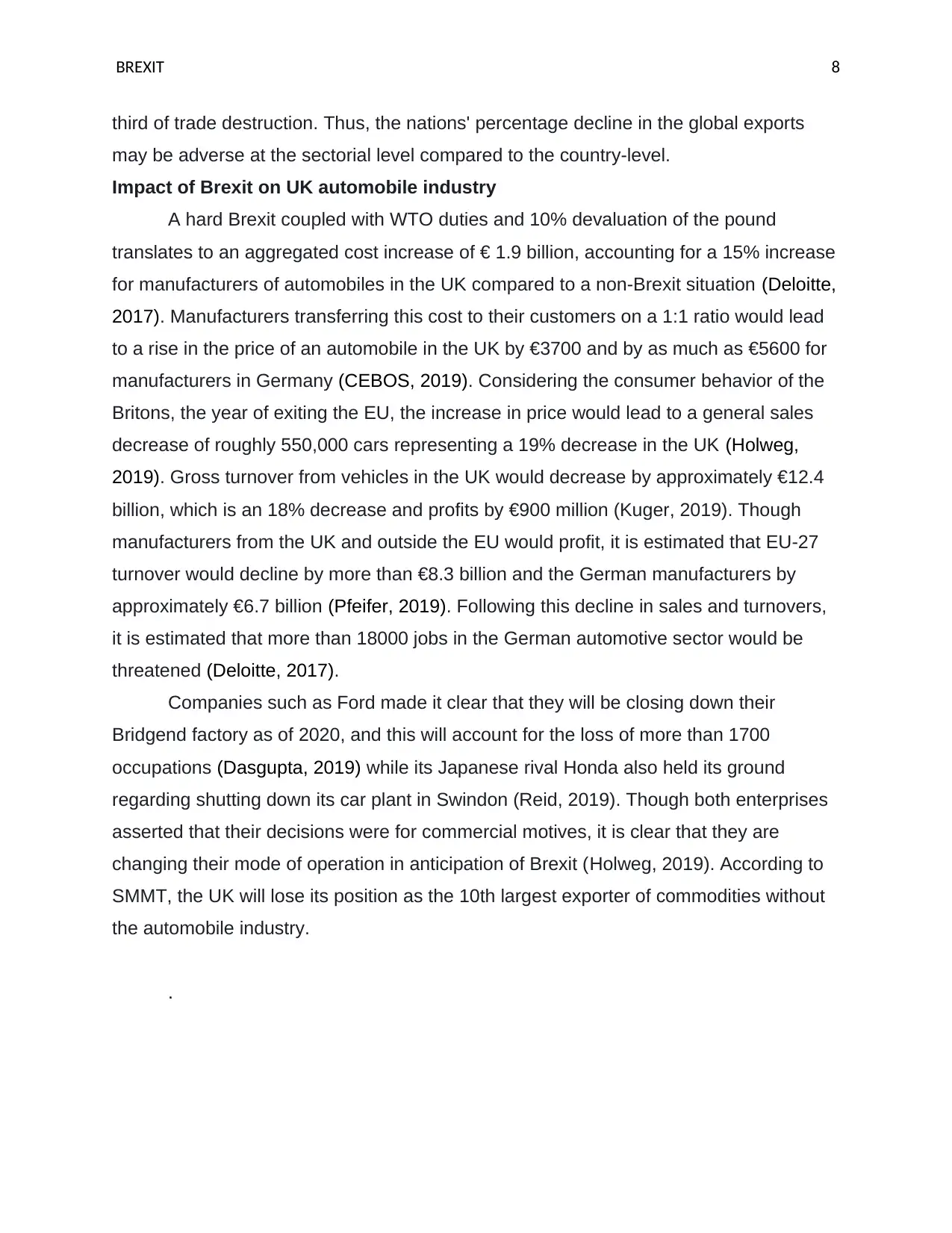
BREXIT 8
third of trade destruction. Thus, the nations' percentage decline in the global exports
may be adverse at the sectorial level compared to the country-level.
Impact of Brexit on UK automobile industry
A hard Brexit coupled with WTO duties and 10% devaluation of the pound
translates to an aggregated cost increase of € 1.9 billion, accounting for a 15% increase
for manufacturers of automobiles in the UK compared to a non-Brexit situation (Deloitte,
2017). Manufacturers transferring this cost to their customers on a 1:1 ratio would lead
to a rise in the price of an automobile in the UK by €3700 and by as much as €5600 for
manufacturers in Germany (CEBOS, 2019). Considering the consumer behavior of the
Britons, the year of exiting the EU, the increase in price would lead to a general sales
decrease of roughly 550,000 cars representing a 19% decrease in the UK (Holweg,
2019). Gross turnover from vehicles in the UK would decrease by approximately €12.4
billion, which is an 18% decrease and profits by €900 million (Kuger, 2019). Though
manufacturers from the UK and outside the EU would profit, it is estimated that EU-27
turnover would decline by more than €8.3 billion and the German manufacturers by
approximately €6.7 billion (Pfeifer, 2019). Following this decline in sales and turnovers,
it is estimated that more than 18000 jobs in the German automotive sector would be
threatened (Deloitte, 2017).
Companies such as Ford made it clear that they will be closing down their
Bridgend factory as of 2020, and this will account for the loss of more than 1700
occupations (Dasgupta, 2019) while its Japanese rival Honda also held its ground
regarding shutting down its car plant in Swindon (Reid, 2019). Though both enterprises
asserted that their decisions were for commercial motives, it is clear that they are
changing their mode of operation in anticipation of Brexit (Holweg, 2019). According to
SMMT, the UK will lose its position as the 10th largest exporter of commodities without
the automobile industry.
.
third of trade destruction. Thus, the nations' percentage decline in the global exports
may be adverse at the sectorial level compared to the country-level.
Impact of Brexit on UK automobile industry
A hard Brexit coupled with WTO duties and 10% devaluation of the pound
translates to an aggregated cost increase of € 1.9 billion, accounting for a 15% increase
for manufacturers of automobiles in the UK compared to a non-Brexit situation (Deloitte,
2017). Manufacturers transferring this cost to their customers on a 1:1 ratio would lead
to a rise in the price of an automobile in the UK by €3700 and by as much as €5600 for
manufacturers in Germany (CEBOS, 2019). Considering the consumer behavior of the
Britons, the year of exiting the EU, the increase in price would lead to a general sales
decrease of roughly 550,000 cars representing a 19% decrease in the UK (Holweg,
2019). Gross turnover from vehicles in the UK would decrease by approximately €12.4
billion, which is an 18% decrease and profits by €900 million (Kuger, 2019). Though
manufacturers from the UK and outside the EU would profit, it is estimated that EU-27
turnover would decline by more than €8.3 billion and the German manufacturers by
approximately €6.7 billion (Pfeifer, 2019). Following this decline in sales and turnovers,
it is estimated that more than 18000 jobs in the German automotive sector would be
threatened (Deloitte, 2017).
Companies such as Ford made it clear that they will be closing down their
Bridgend factory as of 2020, and this will account for the loss of more than 1700
occupations (Dasgupta, 2019) while its Japanese rival Honda also held its ground
regarding shutting down its car plant in Swindon (Reid, 2019). Though both enterprises
asserted that their decisions were for commercial motives, it is clear that they are
changing their mode of operation in anticipation of Brexit (Holweg, 2019). According to
SMMT, the UK will lose its position as the 10th largest exporter of commodities without
the automobile industry.
.
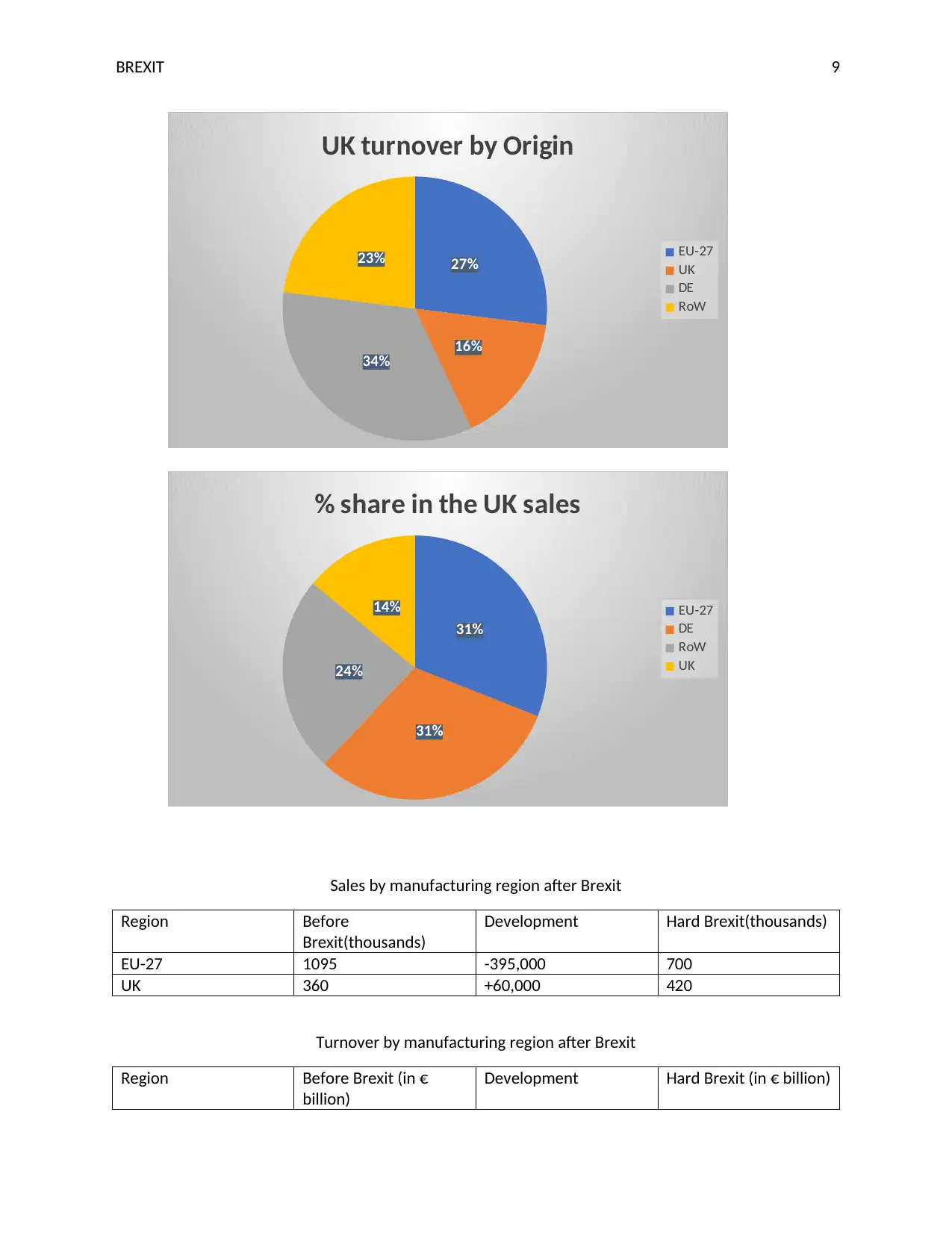
BREXIT 9
27%
16%
34%
23%
UK turnover by Origin
EU-27
UK
DE
RoW
31%
31%
24%
14%
% share in the UK sales
EU-27
DE
RoW
UK
Sales by manufacturing region after Brexit
Region Before
Brexit(thousands)
Development Hard Brexit(thousands)
EU-27 1095 -395,000 700
UK 360 +60,000 420
Turnover by manufacturing region after Brexit
Region Before Brexit (in €
billion)
Development Hard Brexit (in € billion)
27%
16%
34%
23%
UK turnover by Origin
EU-27
UK
DE
RoW
31%
31%
24%
14%
% share in the UK sales
EU-27
DE
RoW
UK
Sales by manufacturing region after Brexit
Region Before
Brexit(thousands)
Development Hard Brexit(thousands)
EU-27 1095 -395,000 700
UK 360 +60,000 420
Turnover by manufacturing region after Brexit
Region Before Brexit (in €
billion)
Development Hard Brexit (in € billion)
⊘ This is a preview!⊘
Do you want full access?
Subscribe today to unlock all pages.

Trusted by 1+ million students worldwide
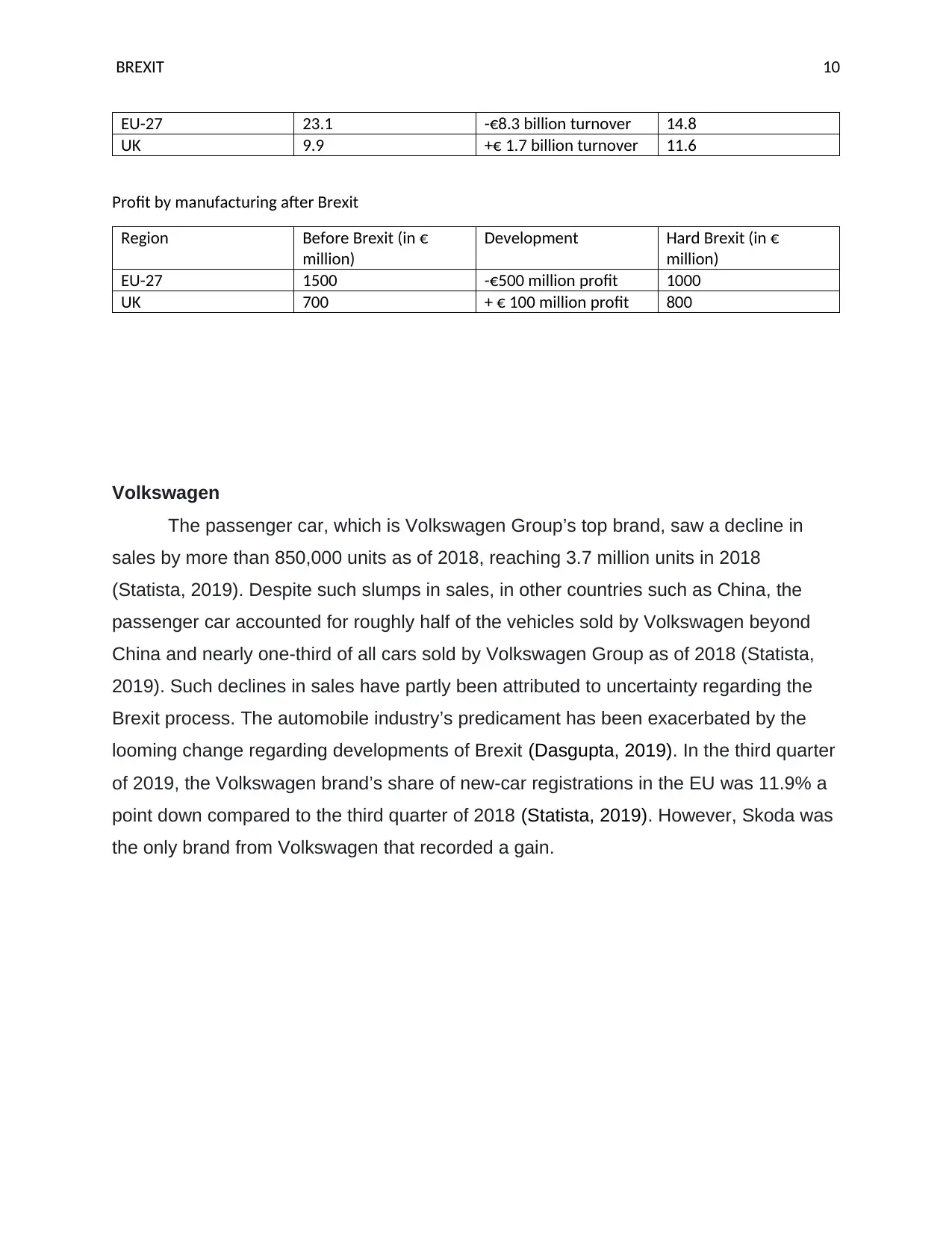
BREXIT 10
EU-27 23.1 -€8.3 billion turnover 14.8
UK 9.9 +€ 1.7 billion turnover 11.6
Profit by manufacturing after Brexit
Region Before Brexit (in €
million)
Development Hard Brexit (in €
million)
EU-27 1500 -€500 million profit 1000
UK 700 + € 100 million profit 800
Volkswagen
The passenger car, which is Volkswagen Group’s top brand, saw a decline in
sales by more than 850,000 units as of 2018, reaching 3.7 million units in 2018
(Statista, 2019). Despite such slumps in sales, in other countries such as China, the
passenger car accounted for roughly half of the vehicles sold by Volkswagen beyond
China and nearly one-third of all cars sold by Volkswagen Group as of 2018 (Statista,
2019). Such declines in sales have partly been attributed to uncertainty regarding the
Brexit process. The automobile industry’s predicament has been exacerbated by the
looming change regarding developments of Brexit (Dasgupta, 2019). In the third quarter
of 2019, the Volkswagen brand’s share of new-car registrations in the EU was 11.9% a
point down compared to the third quarter of 2018 (Statista, 2019). However, Skoda was
the only brand from Volkswagen that recorded a gain.
EU-27 23.1 -€8.3 billion turnover 14.8
UK 9.9 +€ 1.7 billion turnover 11.6
Profit by manufacturing after Brexit
Region Before Brexit (in €
million)
Development Hard Brexit (in €
million)
EU-27 1500 -€500 million profit 1000
UK 700 + € 100 million profit 800
Volkswagen
The passenger car, which is Volkswagen Group’s top brand, saw a decline in
sales by more than 850,000 units as of 2018, reaching 3.7 million units in 2018
(Statista, 2019). Despite such slumps in sales, in other countries such as China, the
passenger car accounted for roughly half of the vehicles sold by Volkswagen beyond
China and nearly one-third of all cars sold by Volkswagen Group as of 2018 (Statista,
2019). Such declines in sales have partly been attributed to uncertainty regarding the
Brexit process. The automobile industry’s predicament has been exacerbated by the
looming change regarding developments of Brexit (Dasgupta, 2019). In the third quarter
of 2019, the Volkswagen brand’s share of new-car registrations in the EU was 11.9% a
point down compared to the third quarter of 2018 (Statista, 2019). However, Skoda was
the only brand from Volkswagen that recorded a gain.
Paraphrase This Document
Need a fresh take? Get an instant paraphrase of this document with our AI Paraphraser
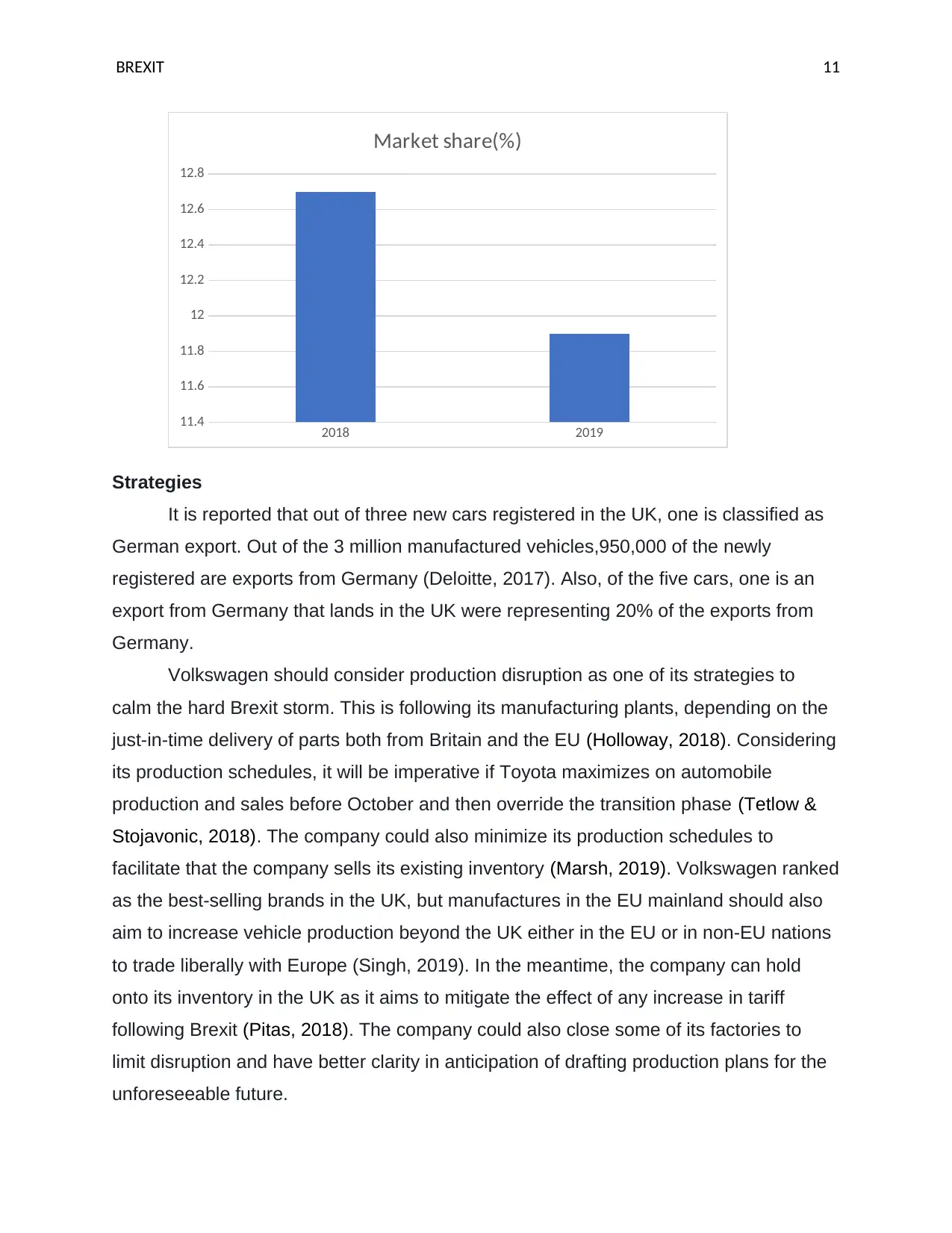
BREXIT 11
2018 2019
11.4
11.6
11.8
12
12.2
12.4
12.6
12.8
Market share(%)
Strategies
It is reported that out of three new cars registered in the UK, one is classified as
German export. Out of the 3 million manufactured vehicles,950,000 of the newly
registered are exports from Germany (Deloitte, 2017). Also, of the five cars, one is an
export from Germany that lands in the UK were representing 20% of the exports from
Germany.
Volkswagen should consider production disruption as one of its strategies to
calm the hard Brexit storm. This is following its manufacturing plants, depending on the
just-in-time delivery of parts both from Britain and the EU (Holloway, 2018). Considering
its production schedules, it will be imperative if Toyota maximizes on automobile
production and sales before October and then override the transition phase (Tetlow &
Stojavonic, 2018). The company could also minimize its production schedules to
facilitate that the company sells its existing inventory (Marsh, 2019). Volkswagen ranked
as the best-selling brands in the UK, but manufactures in the EU mainland should also
aim to increase vehicle production beyond the UK either in the EU or in non-EU nations
to trade liberally with Europe (Singh, 2019). In the meantime, the company can hold
onto its inventory in the UK as it aims to mitigate the effect of any increase in tariff
following Brexit (Pitas, 2018). The company could also close some of its factories to
limit disruption and have better clarity in anticipation of drafting production plans for the
unforeseeable future.
2018 2019
11.4
11.6
11.8
12
12.2
12.4
12.6
12.8
Market share(%)
Strategies
It is reported that out of three new cars registered in the UK, one is classified as
German export. Out of the 3 million manufactured vehicles,950,000 of the newly
registered are exports from Germany (Deloitte, 2017). Also, of the five cars, one is an
export from Germany that lands in the UK were representing 20% of the exports from
Germany.
Volkswagen should consider production disruption as one of its strategies to
calm the hard Brexit storm. This is following its manufacturing plants, depending on the
just-in-time delivery of parts both from Britain and the EU (Holloway, 2018). Considering
its production schedules, it will be imperative if Toyota maximizes on automobile
production and sales before October and then override the transition phase (Tetlow &
Stojavonic, 2018). The company could also minimize its production schedules to
facilitate that the company sells its existing inventory (Marsh, 2019). Volkswagen ranked
as the best-selling brands in the UK, but manufactures in the EU mainland should also
aim to increase vehicle production beyond the UK either in the EU or in non-EU nations
to trade liberally with Europe (Singh, 2019). In the meantime, the company can hold
onto its inventory in the UK as it aims to mitigate the effect of any increase in tariff
following Brexit (Pitas, 2018). The company could also close some of its factories to
limit disruption and have better clarity in anticipation of drafting production plans for the
unforeseeable future.
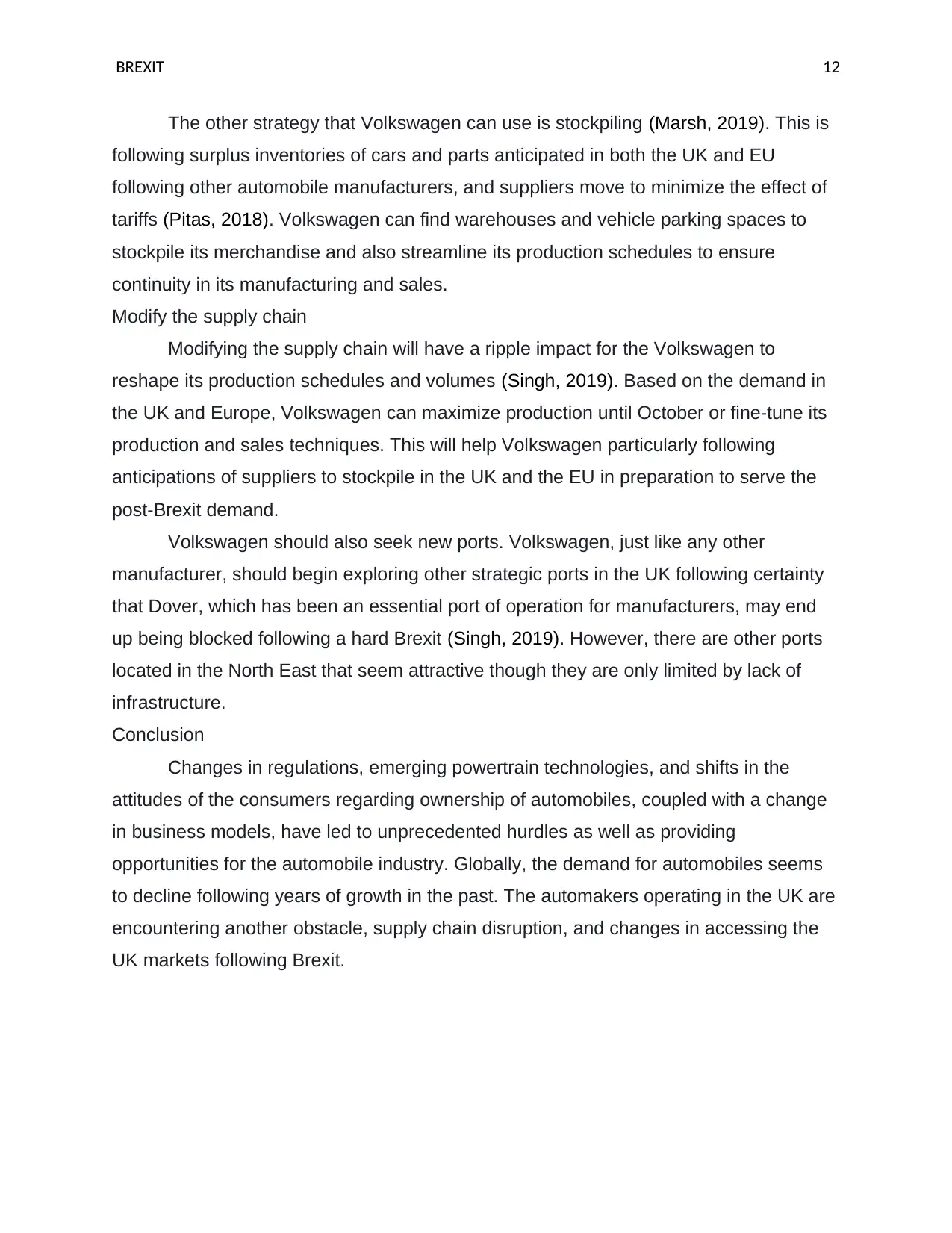
BREXIT 12
The other strategy that Volkswagen can use is stockpiling (Marsh, 2019). This is
following surplus inventories of cars and parts anticipated in both the UK and EU
following other automobile manufacturers, and suppliers move to minimize the effect of
tariffs (Pitas, 2018). Volkswagen can find warehouses and vehicle parking spaces to
stockpile its merchandise and also streamline its production schedules to ensure
continuity in its manufacturing and sales.
Modify the supply chain
Modifying the supply chain will have a ripple impact for the Volkswagen to
reshape its production schedules and volumes (Singh, 2019). Based on the demand in
the UK and Europe, Volkswagen can maximize production until October or fine-tune its
production and sales techniques. This will help Volkswagen particularly following
anticipations of suppliers to stockpile in the UK and the EU in preparation to serve the
post-Brexit demand.
Volkswagen should also seek new ports. Volkswagen, just like any other
manufacturer, should begin exploring other strategic ports in the UK following certainty
that Dover, which has been an essential port of operation for manufacturers, may end
up being blocked following a hard Brexit (Singh, 2019). However, there are other ports
located in the North East that seem attractive though they are only limited by lack of
infrastructure.
Conclusion
Changes in regulations, emerging powertrain technologies, and shifts in the
attitudes of the consumers regarding ownership of automobiles, coupled with a change
in business models, have led to unprecedented hurdles as well as providing
opportunities for the automobile industry. Globally, the demand for automobiles seems
to decline following years of growth in the past. The automakers operating in the UK are
encountering another obstacle, supply chain disruption, and changes in accessing the
UK markets following Brexit.
The other strategy that Volkswagen can use is stockpiling (Marsh, 2019). This is
following surplus inventories of cars and parts anticipated in both the UK and EU
following other automobile manufacturers, and suppliers move to minimize the effect of
tariffs (Pitas, 2018). Volkswagen can find warehouses and vehicle parking spaces to
stockpile its merchandise and also streamline its production schedules to ensure
continuity in its manufacturing and sales.
Modify the supply chain
Modifying the supply chain will have a ripple impact for the Volkswagen to
reshape its production schedules and volumes (Singh, 2019). Based on the demand in
the UK and Europe, Volkswagen can maximize production until October or fine-tune its
production and sales techniques. This will help Volkswagen particularly following
anticipations of suppliers to stockpile in the UK and the EU in preparation to serve the
post-Brexit demand.
Volkswagen should also seek new ports. Volkswagen, just like any other
manufacturer, should begin exploring other strategic ports in the UK following certainty
that Dover, which has been an essential port of operation for manufacturers, may end
up being blocked following a hard Brexit (Singh, 2019). However, there are other ports
located in the North East that seem attractive though they are only limited by lack of
infrastructure.
Conclusion
Changes in regulations, emerging powertrain technologies, and shifts in the
attitudes of the consumers regarding ownership of automobiles, coupled with a change
in business models, have led to unprecedented hurdles as well as providing
opportunities for the automobile industry. Globally, the demand for automobiles seems
to decline following years of growth in the past. The automakers operating in the UK are
encountering another obstacle, supply chain disruption, and changes in accessing the
UK markets following Brexit.
⊘ This is a preview!⊘
Do you want full access?
Subscribe today to unlock all pages.

Trusted by 1+ million students worldwide
1 out of 14
Your All-in-One AI-Powered Toolkit for Academic Success.
+13062052269
info@desklib.com
Available 24*7 on WhatsApp / Email
![[object Object]](/_next/static/media/star-bottom.7253800d.svg)
Unlock your academic potential
Copyright © 2020–2026 A2Z Services. All Rights Reserved. Developed and managed by ZUCOL.


